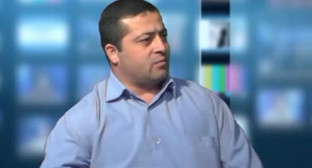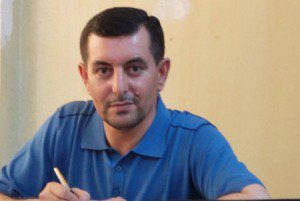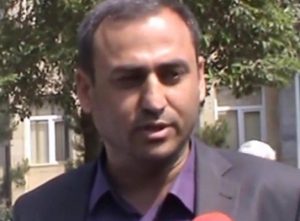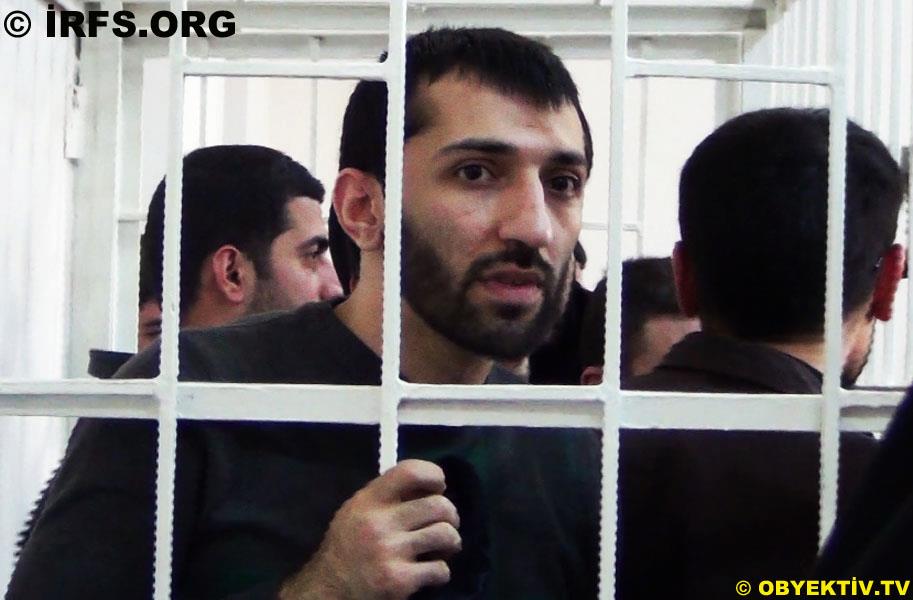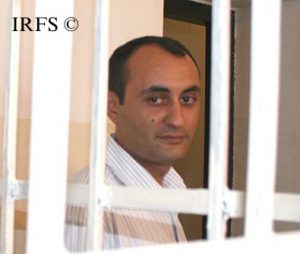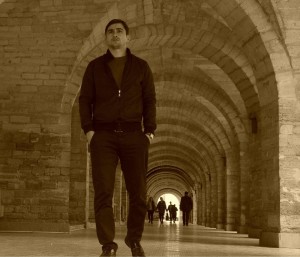29 Mar 2017 | Azerbaijan, Azerbaijan News, Digital Freedom, Mapping Media Freedom, News and features
[vc_row][vc_column][vc_column_text]
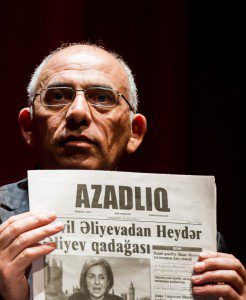
Rahim Haciyev, acting editor-in-chief of 2014 Index on Censorship Freedom of Expression Journalism Award-winning Azerbaijani newspaper Azadliq (Photo: Alex Brenner for Index on Censorship)
Civil, political and human rights are harshly restricted and frequently violated in Azerbaijan. Independent and critical journalists frequently find themselves — or their families — targeted.
Rahim Haciyev, acting editor in chief of the Index Award-winning independent newspaper Azadliq, was forced to flee Azerbaijan after years of official harassment. The government has repeatedly cracked-down on dissent.
Haciyev wrote to Index on Censorship from exile in a western European country:
I’m very sorry that the repressive policy of the Azerbaijani authorities against the Azadliq newspaper forced me to leave the country.
After the arrest of the newspaper’s financial director Faig Amirli, the authorities soon stopped issuing a print version. Amirli was arrested on obviously fabricated charges. I was summoned several times to the prosecutor’s office several times to testify about the paper’s financial affairs. The prosecutors said that this was connected with the criminal case of Amirli, but are invesitgating him under charges of “inciting religious hatred” and “violating the rights of citizens under the pretext of conducting religious rights”.
It turned out that they were interested in the financial issues of the newspaper in order to find a way to silence it. In addition, several employees of the newspaper were summoned for questioning. Then a court ordered tax authorities to comb through the paper’s financial activities. It’s clear that this was undertaken to increase pressure on the newspaper and me personally.
Aiming to cripple Azadliq, the government-owned distribution company was ordered to withhold circulation receipts — $84,000. So we weren’t able to print or even pay our bills. Three staffers are in prison — Seymur Hezi, Faig Amirli and Elchin. Each of them had sharply criticised the lawlessness and corruption of Azerbaijani officials.
In February, 11 Azadliq employees were summoned to the prosecutor’s offices to be interrogated again. Several government agencies increased their pressure on the newspaper’s online operation.
I had been warned twice in the past two years by the prosecutor general’s office that under my leadership Azadliq had been slandering Azerbaijani authorities. In their notices I was told that failure to comply with their terms would mean legal repercussions for me. But I refused. The newspaper continued to report on corruption, abuses of power and the absence of the rule of law. We were devoted to pursuing the truth.
And that is why the authorities intensified repression against the newspaper. Now this lawlessness has forced me to leave the country.
This decision was extremely difficult. I am cut off from my family and friends. I have two children and don’t know when I will see them again.
But despite all the problems I will continue to work daily for the newspaper’s website.
It’s my job, this is my job, this is my life.
Rahim Haciyev
Acting Editor-in-Chief, Azadliq
Haciyev is just one of the many journalists who have been targeted by Azerbaijani authorities in recent years. The country is ranked 163rd out of 180 countries in RSF’s 2016 World Press Freedom Index, which ranks 180 countries according to the level of freedom available to journalists. Almost everyone who speaks out against the regime of President Ilham Aliyev, including journalists, human rights defenders, activists and bloggers, are commonly imprisoned on spurious charges, such as drug and weapon possession, hooliganism and tax evasion. Reports of torture and abuse are typical by those being detained. At least 15 Azerbaijani prisoners of conscience currently remain in jail, including:[/vc_column_text][/vc_column][/vc_row][vc_row][vc_column width=”1/2″][vc_column_text]

Mehman Huseynov (Twitter)
Mehman Huseynov, an Azerbaijani journalist and pro-opposition blogger, was sentenced to two years in jail on 3 March by a Baku court for defaming the police chief of the city’s Nasimi district. Huseynov intends to appeal his sentencing. According to Front Line Defenders, a group of police officers violently attacked Huseynov on 9 January. The next he was brought to court, found guilty of disobeying police orders and fined 200 manat (£96). [/vc_column_text][/vc_column][vc_column width=”1/2″][vc_column_text]
Founder and editor of online news portal Kend.info Elchin Ismayilli was arrested on 17 February on charges of “extorting money” and “aggravated abuse of a position of influence”. According to the Caucasian Knot, he was also accused of blackmailing a local office, charges he insists were fabricated to silence his coverage of local corruption and human rights violations. On 18 February, Ismayilli was sentenced to a pre-trial detention period of 24 days. He has previously been subject to multiple arrests and cases of harassment related to his work as a journalist.[/vc_column_text][/vc_column][/vc_row][vc_row][vc_column width=”1/2″][vc_column_text]
On 3 March, a court decided to prolong the period of investigation of Faig Amirli for three months, the Azerbaijan Press Agency reported. Amirli, financial director of newspaper and assistant chairman of the Azerbaijani Popular Front Party (APFP), was arrested on 20 August 2016 for “inciting religious hatred” and “violating the rights of citizens under the pretext of conducting religious rights,” according to Radio Free Europe/Radio Liberty.[/vc_column_text][/vc_column][vc_column width=”1/2″][vc_column_text]
Writer and blogger Rashad Ramazanov was arrested on 9 May 2013 and sentenced to nine years in prison. According to English PEN, his charges included “illegal possession and sale of drugs”. Police claimed to have found nine grams of heroin on his body, although Ramazanov insists that the drugs were planted by the officers, who he claims also beat him up and tortured him during interrogation. Ramazanov was sentenced to nine years in prison in November 2013 on a trumped-up drug trafficking charge. PEN International reported that on 23 January Ramazanov was moved to solitary confinement for 15 days, the reason for which remains unknown. On 7 February Ramazanov was released from solitary confinement, and his family was given permission to visit him.[/vc_column_text][/vc_column][/vc_row][vc_row][vc_column width=”1/2″][vc_column_text]
Founder and editor of the website Azel, Afgan Sadygov, was sentenced on 12 January to 2.5 years in jail. Sadygov was arrested on 22 November 2016 based on accusations of “hooliganism” after he was attacked on 9 August 2016 and allegedly hit a woman, Contact Online news reported. Sadygov’s website often reports on issues such as poor infrastructure maintenance, bad quality of roads and waste of public funds in Azerbaijan’s Jalilabad region.[/vc_column_text][/vc_column][vc_column width=”1/2″][vc_column_text]
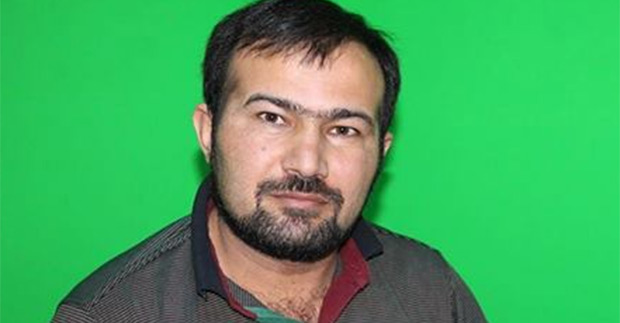
Seymur Hezi
According to MeydanTV, the Supreme Court will hear the appeal of Seymur Hezi, reporter for opposition news source Azadliq and presenter for critical TV program “Azerbaycan Saati” on 13 April. The journalist was sentenced to five years in prison on 29 January 2015 on a trumped-up charge of aggravated hooliganism, Index on Censorship reported. The charge came after Hezi was attacked on 29 August by Maherram Hasanov, a complete stranger, and defended himself. Hezi has accused President Ilham Aliyev and chief of staff Ramiz Mehdyev of ordering his arrest.[/vc_column_text][/vc_column][/vc_row][vc_row][vc_column width=”1/2″][vc_column_text]
The lawyer of Nijat Aliyev, former chief editor of religious website Azadxeber.org, has not been able to get hold of the text of the verdict of the Supreme Court of Azerbaijan for his client, Contact Online news reported. Aliyev’s lawyer believes that the delay has been intentional in order to prevent the filing of a complaint with the European Court of Human Rights, Contact Online news reported. According to IRFS, Aliyev was detained on 20 May 2012 and sentenced to 10 years in prison on 9 December 2013 on charges of illegal possession of drugs and weapons, incitement of religious hatred, calls to seize power and distributing banned religious literature. Aliyev’s website previously published criticisms of the government’s policies in regards to religion, the possibility of a LGBT parade in Baku and the allotment of too much funding for the Eurovision Song Contest in 2012, OCCRP reported.[/vc_column_text][/vc_column][vc_column width=”1/2″][vc_column_text]
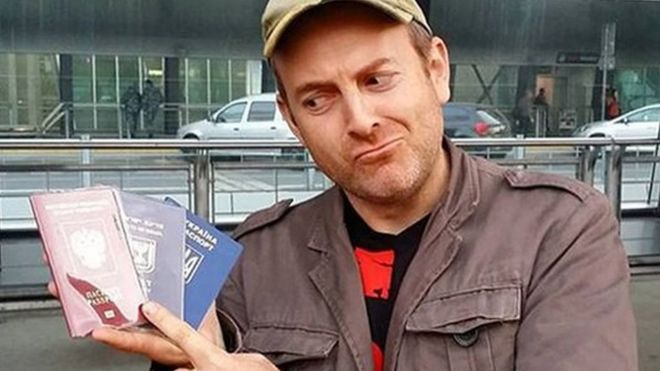
Alexander Lapshin (BBC)
Russian-Israeli travel blogger Alexander Lapshin was extradited from Belarus to Azerbaijan on 7 February. He faces up to five years in prison on charges of “public calls against the state” and “unauthorised crossing of borders,” according to Armenian News Agency ArmenPress. These charges came after Lapshin traveled to the disputed territory of Nagorno-Karabakh and sympathised in his blog entries with the Armenians he met, GlobalResearch reported. [/vc_column_text][/vc_column][/vc_row][vc_row][vc_column width=”1/2″][vc_column_text]
Fikrat Faramazoglu, editor-in-chief of news website jam.az, has been detained since 30 June 2016 on the charge of extortion by means of threats, which is punishable by up to five years in prison. According to Azerbaijan Free Expression Platform, these charges originated when a local restaurant owner accused Faramazoglu of extorting money from him when asked to remove defamatory articles about the restaurant on websites owned by the journalist.[/vc_column_text][/vc_column][vc_column width=”1/2″][vc_column_text]
Blogger and social media activist Abdul Abilov has been imprisoned since 22 November 2013. According to Azerbaijan Free Expression Platform, Abilov was charged with illegal possession, storage and manufacturing or sale of drugs when authorities claim to have found illegal drugs in his home and on his person, which Abilov continues to protest were planted on him. On 27 May 2014 Abilov was sentenced to five-and-a-half years in prison. Stop Sycophants!, the Facebook page previously run by Abilov, was shut down following his arrest, IRFS reported. The page was known to strongly criticise authorities.[/vc_column_text][/vc_column][/vc_row]
6 Mar 2017 | Azerbaijan, Azerbaijan Statements, Campaigns, Campaigns -- Featured, Statements
[vc_row][vc_column][vc_column_text]The undersigned organisations condemn in the strongest possible terms Friday’s sentencing of Mehman Huseynov, Azerbaijani journalist and chairman of the country’s leading freedom of expression group, Institute for Reporters’ Freedom and Safety, to two years in jail on defamation charges. He was taken into custody from the courtroom, without being allowed to speak in his defence.
The 24 organisations are deeply concerned by the continued targeting of Mehman Huseynov and call on the Azerbaijani authorities to immediately and unconditionally release him and all other political prisoners, and to reverse the continuous clampdown on freedom of expression occurring in the country.
“Today’s sentencing and jailing of Mehman Huseynov is outrageous – another example of Azerbaijan’s best and brightest being targeted for expressing opinions critical of the ruling Aliyev regime. It also shows that nothing has changed since the release of a number of high-profile political prisoners last year. The revolving-door policy of politically motivated arrests is still very much in place. Huseynov is now one of at least 13 journalists, bloggers, and media workers jailed in Azerbaijan. They must all be immediately and unconditionally released, in accordance with Azerbaijan’s international obligations”, said Rebecca Vincent, UK Bureau Director for Reporters Without Borders.
Huseynov’s conviction stems from criminal defamation charges in a private case brought by the chief of the police department, related to a report he published in which he wrote about his experience of torture, after he was detained overnight by police in January,
Mehman Huseynov was detained in Baku on 9 January by plain clothed police officers and held incommunicado overnight. Huseynov has reported that while in police custody, police placed a sack over his head and used force against him. He was convicted of disobeying police orders; and although the Court released him on 10 January, he was fined, and continued to face police harassment. The court has imposed a formal travel ban on Huseynov who already has been deprived of his travel documents for the past five years.
”Mehman Huseynov`s case is emblematic of the abusive and arbitrary methods used to punish and attempt to silence human rights defenders, journalists and activists.

Mehman Huseynov (Twitter)
must be released immediately and unconditionally, he has to have compensation for torture and ill-treatment, and those who are responsible for torture and ill-treatment, regardless of their position, have to be brought to justice. The international community must act, given the continued and increased repression against human rights defenders, journalists and lawyers in Azerbaijan. The dire human rights situation in Azerbaijan deserves the highest attention and action at the Human Rights Council.”, says Florian Irminger, Head of Advocacy, Human Rights House Foundation.
”We are shocked and deeply distressed by this shameful verdict, which is nothing but a mockery of justice. Azerbaijani law-enforcement agencies have earned notorious reputations for using brutal and unlawful interrogation methods. Instead of investigating the credible torture claims, the authorities have chosen to jail the blogger”, says Gulnara Akhundova, Head of Global Response, International Media Support.
Notably, Mehman Huseynov has been critical of the appointment of first lady Mehriban Aliyeva to the post of the Vice President on 21 February 2017.
“Prior to the appointment of first lady Mehriban Aliyeva to the post of the Vice President on 21 February 2017, the Azerbaijani government has pursued a new wave of detentions and harassment of activists, journalists and bloggers, apparently aimed at consolidating the government’s authoritarian rule and preventing any dissent around the controversial appointment.” says Sasha Koulaeva, Head of Eastern Europe-Central Asia Desk, FIDH.
Detentions of Political Opposition
Ahead of the Vice-Presidential appointment, since the amendment was passed in September, authorities have arrested several representatives of the political opposition on false, politically-motivated charges, including ten members of Azerbaijan Popular Front Party, one member of the Republican Alternative Movement (REAL) and one member of the D18 movement.
There are credible allegations of torture and other cruel and degrading treatment of the detainees. For example, Rahim Shaliyev, a REAL Movement member detained on 20 February and subsequently sentenced to 30 days administrative detention on charges of resisting police, reported to his lawyer that he was subject to beatings and humiliation, resulting in an injury to his skull.
Crackdown on media
Journalists have also been subject to arbitrary detention and harassment. On 17 February 2017 Elchin Ismayilli, founder and editor of Kend.info, an on-line news portal known for its reporting on corruption and human rights violations in the Ismayilli region of Azerbaijan, was detained by police. He is accused of threatening a local government employee and has been charged with extortion and abuse of a position of influence. Ismayilli denies all the charges. On 18 February, the Nasimi District Court sentenced Ismayilli to pre-trial detention for an initial period of 24 days. Ismayilli is currently being held in the Kurdakhani pretrial detention centre.
On 22 February, cable TV channels stopped all the authorities officially suspended all broadcasts by the Turkish affiliate of FOX TV, after the channel aired a satirical discussion on the appointment of the new Vice President. A spokesperson for the National Television and Radio Council (NTRC) of Azerbaijan stated that this decision was made at the sole discretion of cable providers; however, anonymous sources within the cable providers have reported that they faced pressure from the NTRC to drop the channel.
At the same time, the authorities have continued their harassment of opposition newspaper Azadliq, which was forced to cease abandon print publication in September 2016, following ongoing financial pressures from state-owned or affiliated companies. In the second half of February 2017, over ten staff members were summoned and interrogated by the Serious Crimes Investigation Department. The publication’s Financial Director, Faiq Amirov, and prominent journalist, Symur Hezi, have been incarcerated on trumped up charges since August 2016 and August 2014, respectively.
Activists expressing critical views on the internet and social media, the last bastion of freedom of expression, have also been subject to police pressure, aimed at forcing them to delete dissenting posts. For example, on 21 February Nisakhanim Valiyeva, the Chair of the Classical Popular Front Party was held in police custody for four hours, the same day that Merhiban Aliyeva was appointed Vice President, and released only after deleting her critical Facebook posts about the appointment.
This has been accompanied by calls for increased regulation of the internet and online content. The chair of the Press Council Aflatun Amashov, whose official mandate is to safeguard independent media and rights of journalists, has submitted a proposal to the Milli Majlis (Parliament), calling for mandatory registration of bloggers and activists, aimed at ensuring greater control over those expressing themselves online.
Harassment of critics in exile
The government of Azerbaijan is also pursuing government critics living in exile abroad. Shortly after giving a speech at the European Parliament on the human rights situation in Azerbaijan on 6 February, Emin Milli, head of Meydan TV, a critical TV channel operating in exile from Berlin, reported to German Police receiving threats of physical violence from the Azerbaijani authorities.
“The Azerbaijani authorities persistently violate freedom of expression and other human rights, both at home and abroad”, said Katie Morris, Head of Europe and Central Asia at ARTICLE 19. “With this happening in their own backyard, European governments can no longer ignore the arrests, torture and harassment of government critics and their families and must call the Azerbaijan government to account”, she added.
Where the authorities are unable to reach their critics, they have sought to harass family remembers remaining in Azerbaijan. Most recently, on the 22nd of February, the brother Dadashov Khanlar and nephew Sabuhi Zanalov of Netherlands-based blogger Ordukhan Teymurkhan, known for his criticism of the Aliyevs, were sentenced to 30 days detention on entirely bogus charges of disobeying police orders.
We, the undersigned organisations, call on the government of Azerbaijan to cease its harassment and detention of government critics. Allegations of torture must be investigated, and all political prisoners must be immediately and unconditionally released.
The relentless campaign waged by the authorities against media workers, bloggers, political activists, civil society and others that are deemed to threaten the power of the ruling regime must stop immediately.
We also call on the international community to exert political pressure and take all the necessary measures until Azerbaijan fully honours its human rights commitments.
ARTICLE 19
CEE Bankwatch Network
Committee to Protect Journalists (CPJ)
Crude Accauntability
Eastern Partnership Civil Society Forum
FIDH – Indernational Federation for Human Rights
Freedom House
Freedom Now
Front Line Defenders
Helsinki Foundation for Human Rights
Human Rights First
Human Rights House Foundation
IFEX
Index on Censorship
International Media Support
International Partnership for Human Rights
Institute for Reporters’ Freedom and Safety
Netherlands Helsinki Committee
Norwegian Helsinki Committee
PEN International
People in Need
Polish Green Network
Reporters Without Borders (RSF)
World Organisation Against Torture (OMCT)[/vc_column_text][vc_row_inner equal_height=”yes” content_placement=”middle” css=”.vc_custom_1488907664556{margin-bottom: 25px !important;background-color: #dd3333 !important;}” el_class=”text_white”][vc_column_inner width=”1/2″][vc_custom_heading text=”Protect Media Freedom” font_container=”tag:p|font_size:28|text_align:left” use_theme_fonts=”yes” link=”url:https%3A%2F%2Fwww.indexoncensorship.org%2Fdefend-media-freedom-donate-index%2F|||”][vc_column_text]
Support Index’s work.
We monitor threats to press freedom, produce an award-winning magazine and publish work by censored writers.[/vc_column_text][/vc_column_inner][vc_column_inner width=”1/2″ css=”.vc_custom_1488907628643{background-image: url(https://www.indexoncensorship.org/wp-content/uploads/2013/08/newspapers.jpg?id=50885) !important;background-position: center !important;background-repeat: no-repeat !important;background-size: cover !important;}”][/vc_column_inner][/vc_row_inner][/vc_column][/vc_row][vc_row][vc_column][vc_basic_grid post_type=”post” max_items=”4″ element_width=”6″ grid_id=”vc_gid:1488907408421-e22a85a0-aabc-5″ taxonomies=”7145″][/vc_column][/vc_row]
8 Feb 2017 | Azerbaijan, Mapping Media Freedom, News and features
[vc_row][vc_column][vc_column_text]
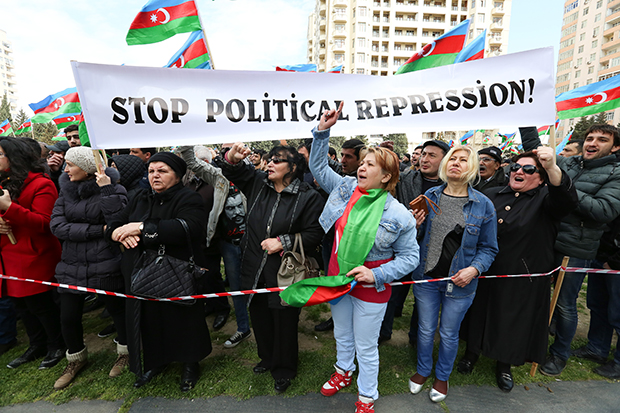
Photo: Aziz Karimov
For Azerbaijan’s president Ilham Aliyev and many other authoritarian leaders across the world, independent journalism and what it represents is bad news. The more irritating leaders find journalists’ work, the harsher consequences are for those reporting. This has been one of the most worrying trends across the world in recent years.
In 2016, there were 38 threats to press freedom reported to the Index on Censorship project Mapping Media Freedom. Journalists critical of the government were tortured and arrested. Internet sites were repeatedly blocked. TV outlets were knocked off the air through revocation of broadcast licences. Newspapers were starved to near bankruptcy and prevented from printing. Online criticism of the country’s hereditary president has been outlawed. Even family members of journalists have been targeted.
“In the last year alone, authorities have either detained, arrested, questioned six journalists and one blogger. Some parliament members have even hinted at introducing legislation that would monitor social media. The relentless pressure on media professionals and citizen journalists in Azerbaijan is aimed at shutting down any criticism of the Aliyev regime. The continued crackdown on freedom of speech is a clear violation of human rights,” Hannah Machlin, Mapping Media Freedom project officer, said.
The dismal state of free expression in Azerbaijan catalogued by Mapping Media Freedom is indirectly validated by Reporters Without Borders’ 2016 Press Freedom Index. That organisation found a disturbing decline in respect for media freedom around the world.
“It is unfortunately clear that many of the world’s leaders are developing a form of paranoia about legitimate journalists,” secretary general of RSF Christophe Deloire said.
Azerbaijan ranks 163rd on the press freedom index. The country’s ruling powers have long banned independent journalism and anyone who remained defiant was branded an agent, a traitor, a hooligan, a drug addict, anything but a journalist. While Mapping Media Freedom began closely monitoring the country in the second quarter of 2016, the clampdown on journalists long precedes this.
In 2014, authorities shut down the office of Azerbaijan Service for Radio Free Europe Radio Liberty. Around the same time, the dissident media outlet Meydan TV, shut down its office fearing a similar action. Its reporters on the ground have been detained, questioned and placed on travel ban lists ever since. Independent newspapers such as Zerkalo and Azadliq have been stifled with numerous libel charges. Both newspapers ceased printing issues with Azadliq available to its readers online only. One, columnist and TV anchor Seymur Hezi, remains in jail following a charge of “aggravated hooliganism” saw him sent to prison for over five years.
Azerbaijan’s media in exile
As the space for a free media shrank over the past few years, journalists fled the country. Some have chosen neighbouring Georgia as their base while others continue their work from Berlin and elsewhere.
Since 2015, a group of exiled Azerbaijani civil society activists who have been based in Georgia have designed a project to create opportunities for Azerbaijani journalists based in Georgia’s capital, Tbilisi, to work with local media outlets. Under the guidance of the Human Rights House Tbilisi, this initiative has involved at least a dozen journalists from Azerbaijan. The group has reported on the human rights and the day-to-day of living in Georgia.
Gulnur Kazimova left Azerbaijan out of fear of persecution and is currently based in Tbilisi where she lives with her family. She was among the participants of the HRH initiative. During the programme she reported on women’s issues that Azerbaijani community faced in Georgia. One such story was about a 19-year-old woman who was constantly beaten and threatened by her husband who kidnapped her at the age of 13 and eventually murdered her by cutting her throat. Another exiled journalist, Tural Gurbanli, wrote about the issue of wearing hijab in the village of Karajala, which is mostly populated by Azerbaijanis who have settled in Georgia.
Emin Milli, a former political prisoner, who currently lives in exile in Berlin, created Meydan TV, an online media platform. With over 400,000 likes on their Facebook page, and over 60,000 subscribers to its YouTube Channel, Meydan TV has strived to present a comprehensive picture of Azerbaijan by collecting news, conducting interviews and providing independent reporting. Its freelance contributors inside the country have paid a heavy price for this: they have been persecuted by the police, detained, questioned and placed on no travel lists.
Radio Free Europe and Radio Liberty Azerbaijan Service’s contributors have also been targeted by officials in the country. Like Meydan TV, Radio Liberty has a large following on Facebook with over 400,000 readers and more than 100,000 subscribers on YouTube.
Index on Censorship Award-winning Azadliq newspaper continues its coverage of the country through its online presence despite the ongoing targeting by the government. The newspaper’s editor-in-chief is exiled while his family members have been harassed by the authorities, and the newspaper’s chief financial director was arrested for his alleged support for Gulen religious movement said to be behind the failed coup in Turkey and his criticism of the authorities and was recently sentenced to 10 years in jail.
The current list of political prisoners that stands around 100 individuals includes prominent journalist Seymur Hezi, as well as other journalists and bloggers who have been jailed on bogus charges. Despite the release of top investigative reporter Khadija Ismayil in May of 2016, along with a number of other prominent political prisoners, the new arrests and crackdown against existing independent media, its reporters and its platforms are indicative of a revolving door policy when it comes to press freedom in Azerbaijan. [/vc_column_text][vc_basic_grid post_type=”post” max_items=”4″ element_width=”6″ grid_id=”vc_gid:1486487716820-6a1b311c-3186-5″ taxonomies=”7145″][/vc_column][/vc_row]


